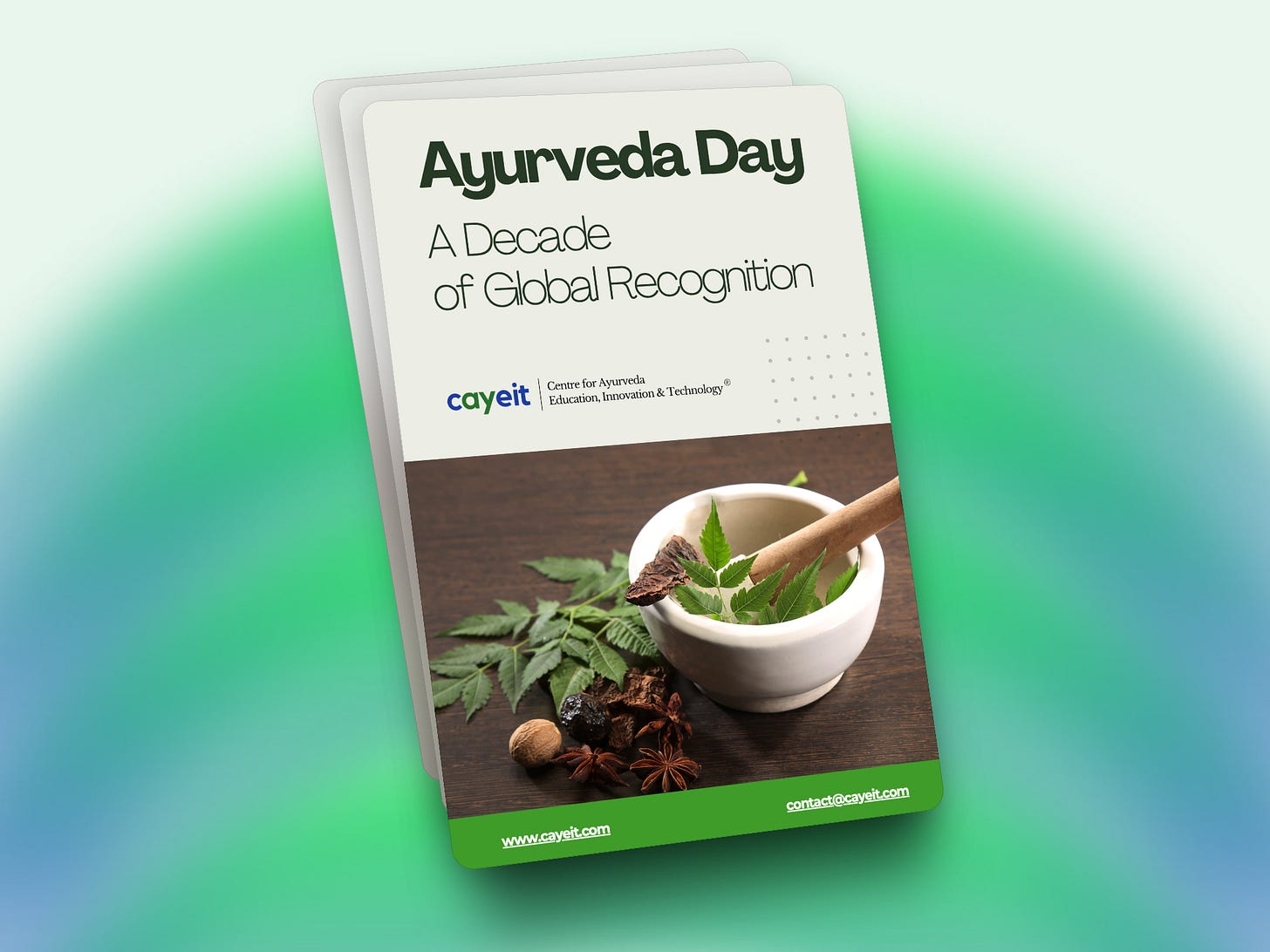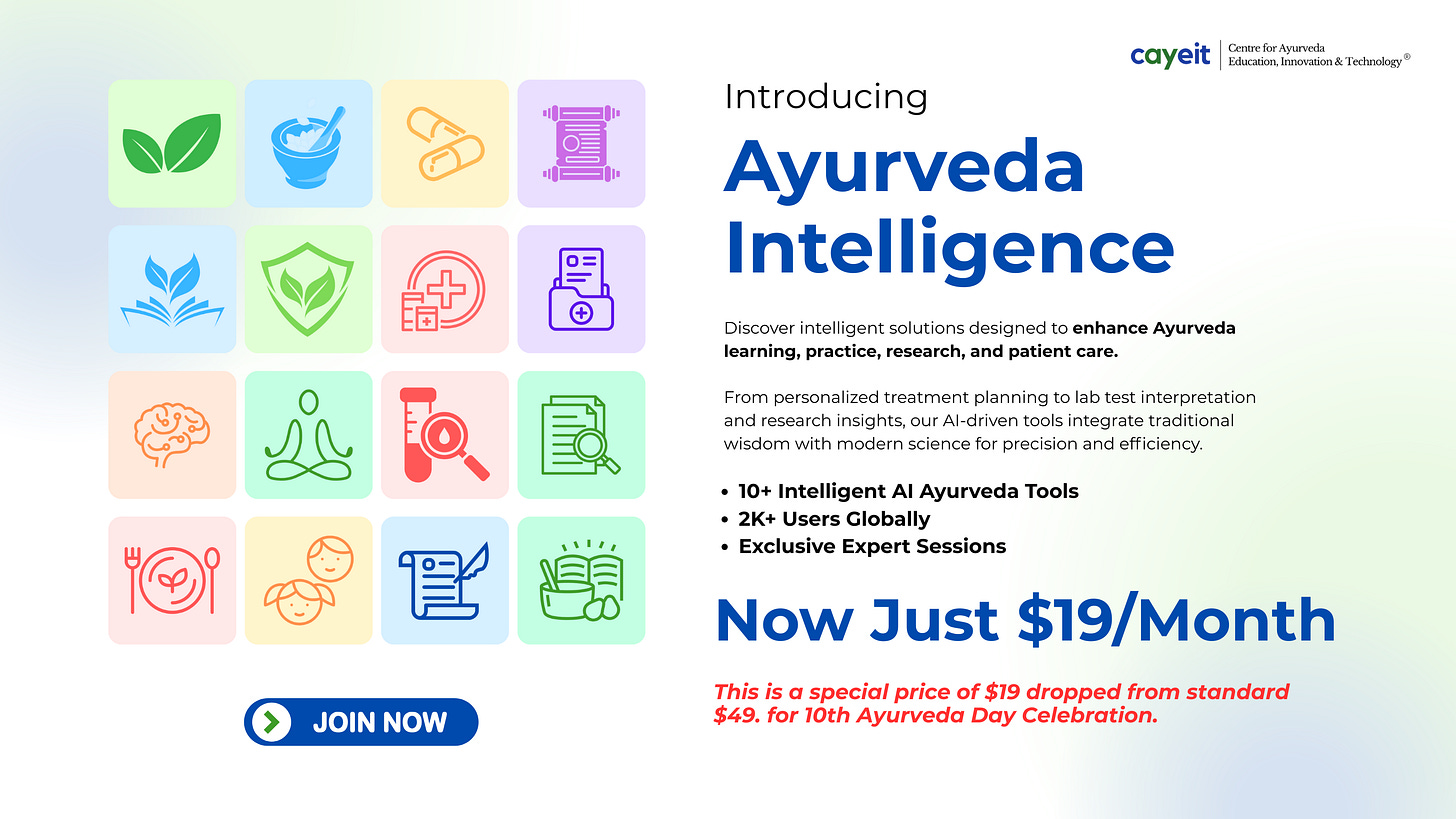Ayurveda Day: A Decade of Global Recognition (2016–2025)
Ayurveda Post | Issue #25 (Sept 2025)
This September, the world celebrates the 10th Ayurveda Day, marking a decade since the Ministry of Ayush first initiated this global observance in 2016. From its roots in India’s living traditions, Ayurveda has now entered the international stage of science, sustainability, and planetary health.
In March 2025, the Government of India issued a Gazette Notification officially declaring 23rd September as Ayurveda Day every year-a milestone that signifies Ayurveda’s recognition as both a national treasure and a global healthcare ally.
This special joint issue of Ayurveda Post traces the journey of Ayurveda Day from its beginnings to its role today as a platform for ‘Ayurveda for People, Ayurveda for Planet.’We showcase key achievements, highlight scientific advances, and spotlight international collaborations that have made this decade a turning point for Ayurveda’s integration into global wellness and sustainability dialogues.
Chief Editor
Read “Ayurveda Day : A Decade of Global Recognition” Ebook now.
Ayurveda Day: 2016-2025 Timeline of Transformation
From the first observance in 2016 to the grand celebration in Goa on 23rd September 2025, Ayurveda Day has evolved from a national event to a global movement.
2016 – “Ayurveda for Prevention and Promotion of Health” : Launch year emphasizing preventive healthcare and daily wellness practices beyond treatment.
2017 – “Ayurveda for Longevity” : Focused on extending healthy lifespan through balance, Rasayana (rejuvenation), and lifestyle regimens.
2018 – “Ayurveda for Public Health” : Highlighted Ayurveda’s role in strengthening community health and cost-effective primary care.
2019 – “Ayurveda for Prevention and Management of Diabetes” : Addressed India’s diabetes burden; showcased Ayurvedic diet, lifestyle, and herbal solutions.
2020 – “Ayurveda for COVID-19 and Immunity” : Pandemic focus; promoted immune-boosting practices, Ayush Kwath, and integrative care.
2021 – “Ayurveda for Poshan (Nutrition)” : Linked with India’s nutrition mission; stressed balanced diets, seasonal eating, and digestive health.
2022 – “Har Din Har Ghar Ayurveda” (Ayurveda Every day, Ayurveda for Everyone) : Expanded Ayurveda into homes; encouraged adoption of simple daily practices.
2023 – “Ayurveda for One Health” : Connected Ayurveda with global “One Health” vision—human, animal, and environmental well-being.
2024 – “Ayurveda for Lifestyle and Longevity” : Focused on preventing non-communicable diseases and promoting healthy ageing via lifestyle medicine.
2025 – “Ayurveda for People, Ayurveda for Planet” : 10th Anniversary theme at AIIA Goa; placed Ayurveda at the intersection of global well-being and planetary sustainability.
Read “Ayurveda Day : A Decade of Global Recognition” Ebook now.
Introducing Ayurveda Intelligence Platform
Over 10+ intelligent Ayurveda AI tools, trusted by 5,000+ users worldwide, now empowering learning, practice, research, and patient care in Ayurveda.
If you wish to gain access, please join now using the link: CLICK HERE
This is a special price of $19 dropped from standard $49. for 10th Ayurveda Day Celebration.
Triphala: Ayurveda’s Natural Prebiotic for Gut Health
Research shows that Triphala, a classical Ayurvedic formulation, can reshape the gut microbiome in remarkable ways. In laboratory studies, it boosted beneficial bacteria like Bifidobacterium and Lactobacillus while reducing harmful microbes such as Citrobacter and Klebsiella.
Even more importantly, Triphala promoted the growth of butyrate-producing bacteria-microbes that support gut lining integrity, reduce inflammation, and improve overall colon health. Scientists also found that its natural plant sugars act as prebiotic substrates, nourishing good microbes and diversifying the gut ecosystem.
This evidence underscores what Ayurveda has long maintained: healthy digestion is the foundation of strong immunity and total well-being. Read More
EAT-Lancet’s Planetary Diet echoes Ayurveda’s Ahara Vidhi: seasonal, local, plant-based.
Ayurvedic agriculture and regenerative herb cultivation reduce environmental burden.
WHO “One Health” framework aligns with Ayurveda’s Loka-Purusha Samya.
The Charaka Samhita opens with a foundational sutra:
“आयुः कामायमानेन धर्मार्थसुखसाधनम्।
आयुर्वेदोपदेशेषु धर्मार्थसुखसाधनम्॥” (Sutra Sthana 1.15)
Translation (scientific context):
Life (Āyus) is the essential prerequisite for achieving Dharma (ethical conduct), Artha (material prosperity), and Sukha (happiness or well-being). The purpose of Ayurveda is to provide systematic guidance to protect, optimize, and extend that life in harmony with natural laws.
From a biomedical and public health lens, Charaka’s sutra conveys three enduring insights: health is the foundation for human goals, not just the absence of disease; Ayurveda prioritizes prevention and promotion of well-being over mere treatment; and it insists on living in harmony with natural rhythms, a view now supported by circadian biology and ecological health science. In essence, Ayurveda frames health as a multidimensional resource that enables human flourishing. Read More
Stay tuned for more expert insights, research breakthroughs, and Ayurvedic wisdom in the next edition of Ayurveda Post! Email us at ✉️ contact@cayeit.com
Warm regards,
Ayurveda Post Team








